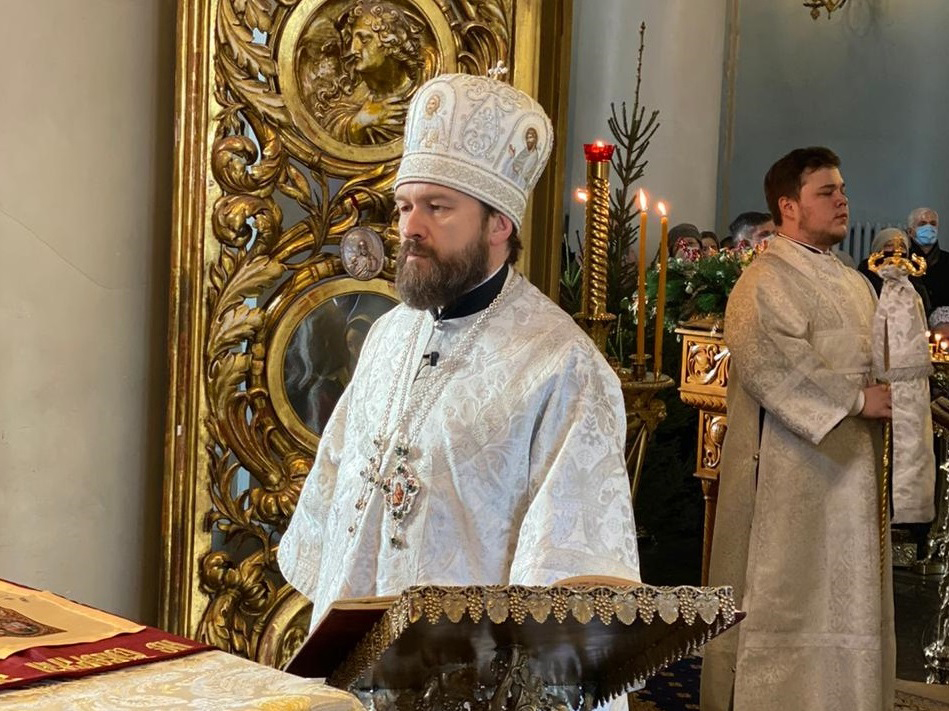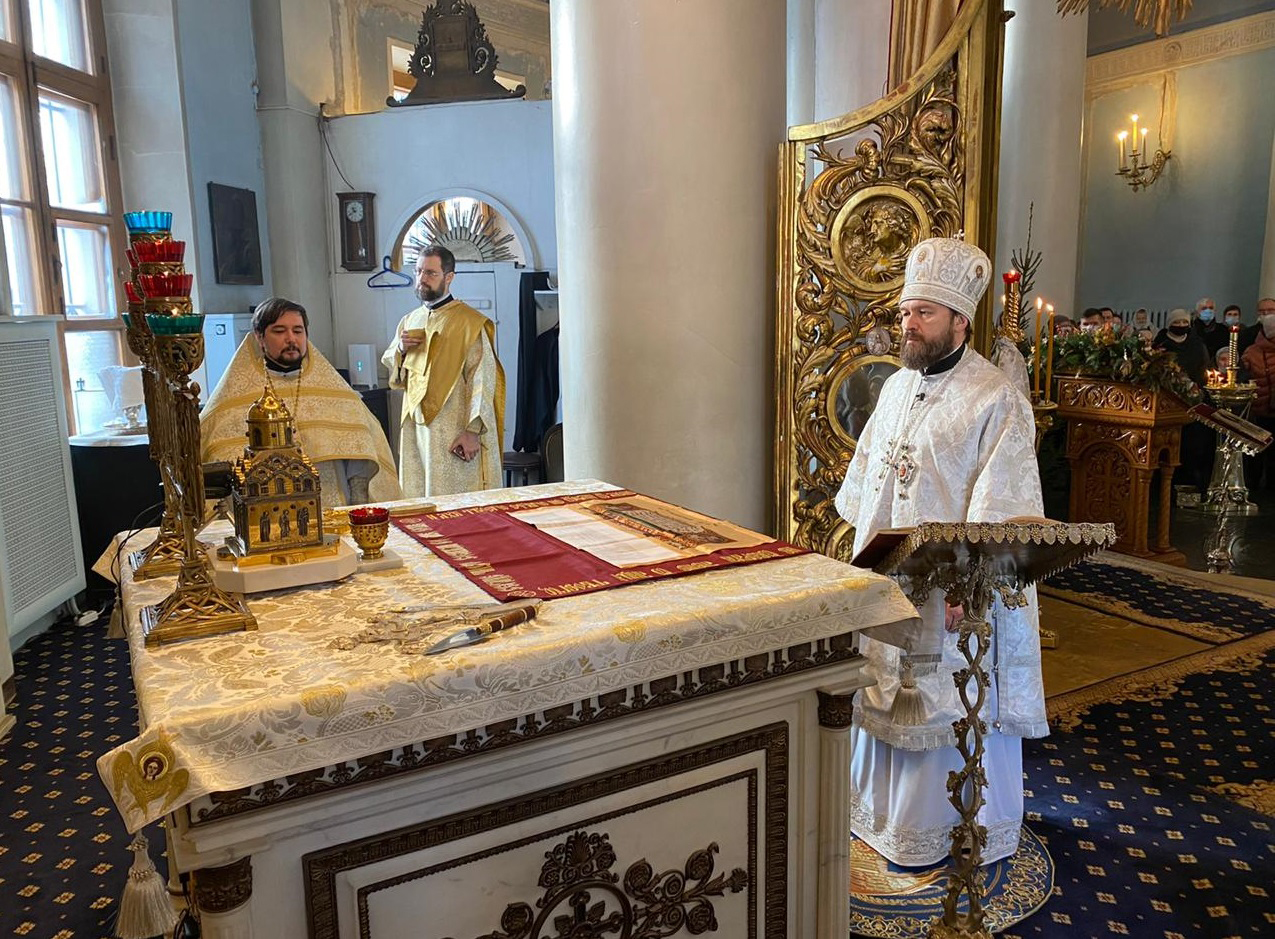
Department for External Church Relations
The site uses cookies to help show you the most up-to-date information. By continuing to use the site, you consent to the use of your Metadata and cookies. Cookie policy
Metropolitan Hilarion: to repent means to change your way of life


On January 17, 2021, the 32th Sunday after Pentecost, before the feast of the Theophany, Metropolitan Hilarion of Volokolamsk, head of the Moscow Patriarchate’s department for external church relations (DECR), celebrated the Divine Liturgy at the church of Our Lady the Joy to All the Afflicted-in-Bolshaya-Ordynka in Moscow.
The archpastor was assisted by the clergy of the church.
After the Prayer of Fervent Supplication, prayerful petitions were lifted up about the threat of the spreading coronavirus infection.
Then Metropolitan Hilarion lifted up the prayer read during the spread of an evil epidemic.
After the service, His Eminence Hilarion addressed himself to the faithful with a homily:
“In the name of the Father and of the Son and of the Holy Spirit!
On the Sunday before the Theophany day we hear the Gospel’s story about John the Baptist. We read it in the very beginning of the Gospel of Mark, which begins with the words: ‘The beginning of the gospel of Jesus Christ, the Son of God…’ (Mk.1:1), and then follows the story of John the Baptist.
Why was the Gospel of Jesus Christ, that is, the good news brought to the earth by the Saviour, the Son of God and God Incarnate, to begin not with His preaching but with the preaching of another man? Why were the words, ‘repent, for the kingdom of heaven is at hand’ (Mt. 2:1) were not pronounced for the first time by the Lord Jesus Christ, who began His preaching with them, but by John the Baptist? Because God was pleased to send John the Baptist as a messenger to the people of Israel in order to prepare them for welcoming the Lord and Saviour Jesus Christ.
‘John did baptize in the wilderness, and preach the baptism of repentance for the remission of sins’ (Mk. 1:4). John the Baptist said to people, ‘I indeed baptize you with water unto repentance: but he that cometh after me is mightier than I, whose shoes I am not worthy to bear: he shall baptize you with the Holy Ghost, and with fire’ (Mt. 3:11). And people hearkened to his words, some with curiosity, others with fear, still others with bewilderment. They did not know Who John the Baptist was speaking about until – as we hear from the Gospel of John – he said, ‘Behold, the Lamb of God, which taketh away the sin of the world’ (Jn. 1:29).
The Lord was pleased to send this Prophet so that he could prepare His way, make His paths straight and prepare people’s hearts for accepting Christ as God and Saviour.
Among the people of Israel were those who did not accept the Saviour and those few who followed Him. At least some of them were the people who used to come to the Jordan to see John the Baptist and came to believe his preaching.
We remember the words for the Gospel’s story when the Lord was asked, ‘By what authority doest thou these things? and who gave thee this authority to do these things?’ and He replied, ‘I will also ask of you one question, and answer me, and I will tell you by what authority I do these things. The baptism of John, was it from heaven, or of men? answer me’ (Mk. 11:29-30). Having heard these words, scribes and Pharisees reasoned among themselves saying, ‘If we shall say, From heaven; he will say, Why then did ye not believe him? But if we shall say, of men; they feared the people: for all men counted John that he was a prophet indeed’ (Mk. 11:31-32).
Those who did not believe what John the Baptist preached, who did not know how to answer the question: was it the baptism from God or men, did not believe the Lord Jesus Christ either and achieved only His crucifixion at the order of the Roman procurator, while those who believed John the Baptist followed the Lord Jesus Christ just as well, among them some disciples of John the Precursor. This is what we also hear from the Gospel of John.
When John the Baptist pointed at Jesus and said, ‘Behold the Lamb of God’, his two disciples immediately separated themselves and followed Jesus, and when He turned around and saw them following they asked Him, ‘Rabbi (which is to say, Master,) where dwellest thou?’ (Jn. 1:38). They asked that not because they wanted to find out where He lived, but because they wanted to know who He was and what He had come for, and why John the Baptist honoured by them as a prophet pointed precisely at Him as the Lamb of God.
Today too John the Baptist stands before our mental eye pointing at the Lord Jesus Christ and saying, ‘Repent ye: for the kingdom of heaven is at hand’ (Mt. 3:2).
To repent means not only to repent of your evil deeds but to change your way of life, the way of your thinking, to be tuned to always listening to the voice of God addressed to us through the circumstances of our life, through Holy Scriptures and the Church.
Preparing for the feast of the Theophany, which is to come tomorrow and to continue the day after tomorrow, let us ask holy Prophet, Precursor and Baptist John to help us cleanse our minds in order to prayerfully prepare ourselves for a meeting with Christ who comes to the Jordan to take upon Himself the sins of the world, to sanctify our human nature and to open for all of us the way to the Heavenly Kingdom. Amen.
I congratulate you on the feast!”
DECR Communication Service
Patriarch
Sermons
05.01.2026
24.12.2025
24.01.2021
06.11.2020